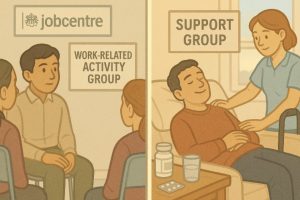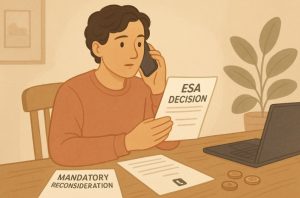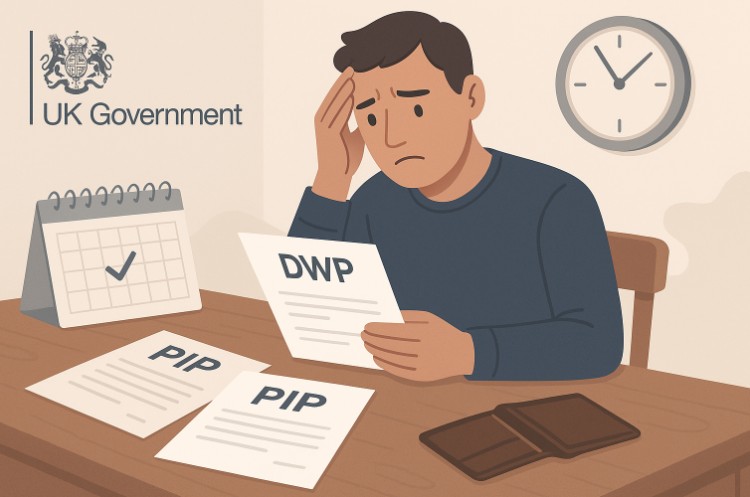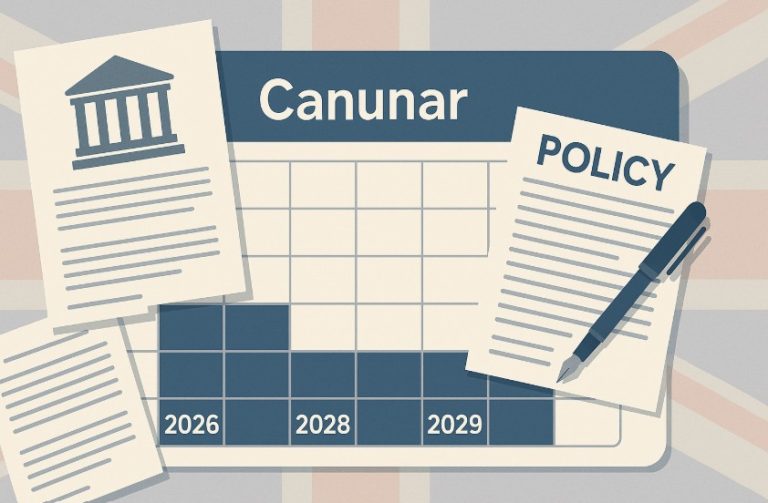Being placed in the Support Group for Employment and Support Allowance (ESA) can significantly impact a person’s financial stability and daily obligations.
Understanding what this placement means is essential for making the most of available support. This guide explores eligibility, benefits, expectations, and how the process works under ESA in the UK.
What is the ESA Support Group and How Does It Differ from the Work-Related Activity Group?

Employment and Support Allowance (ESA) is a benefit for individuals who are unable to work due to illness or disability.
After undergoing a Work Capability Assessment, claimants are placed into either the Work-Related Activity Group (WRAG) or the Support Group.
The Support Group is for individuals whose physical or mental health conditions are so severe that they are not expected to look for work or participate in any work-related activity.
The WRAG is for those who are not currently able to work but could prepare for it in the future.
Key Differences Between the Groups
| Feature | Work-Related Activity Group | Support Group |
| Required to look for work | Yes | No |
| Required to attend interviews | Yes | No |
| ESA payment rate | Lower | Higher |
| Time limit | 365 days (contribution-based) | No time limit |
| Optional work-related activity | Yes | Yes, but completely voluntary |
Who Qualifies for the ESA Support Group?
To qualify for the Support Group, a claimant must be assessed as having a limited capability for both work and work-related activity.
This is usually determined through the Work Capability Assessment process. Eligibility depends on how significantly the individual’s condition affects daily functioning.
Common qualifying factors include:
- Severe mental or physical health conditions
- Terminal illness
- Evidence that work-related activity would risk physical or mental health
- Specific criteria being met on the Capability for Work questionnaire
Some claimants may automatically qualify without needing an assessment, such as those receiving end-of-life care or undergoing long-term hospital treatment.
What Happens After You’re Placed in the ESA Support Group?

Once a claimant has been placed in the ESA Support Group following the Work Capability Assessment, the structure of their benefit claim changes significantly. This placement acknowledges that the individual has a limited capability for both work and any work-related activity due to the severity of their health condition or disability.
Confirmation of Placement
The Department for Work and Pensions (DWP) sends a formal notification confirming the decision. This letter outlines:
- The group the claimant has been placed into (Support Group)
- The date from which the decision takes effect
- The revised payment rate, including the Support Component
- An explanation of the next steps or review dates, if applicable
If the claimant had been submitting medical evidence (fit notes) during the assessment period, these are usually no longer required once the Support Group placement begins—unless specifically requested by the DWP at a later date.
Payments and Entitlements Begin
Claimants begin receiving the higher ESA payment rate, which includes the Support Component. This is typically paid every two weeks and is deposited directly into the claimant’s bank account. The increase in financial support reflects the recognition of more serious limitations and the exemption from work obligations.
In addition to the core ESA payment, being in the Support Group may entitle individuals to further financial support such as:
- Enhanced Disability Premium (for income-related ESA claims)
- Severe Disability Premium (if applicable)
- Free NHS prescriptions, dental care, and eye tests
- Housing Benefit and Council Tax Reduction, depending on individual and household circumstances
These entitlements help cover essential living costs and alleviate financial pressures.
Exemption from Work-Focused Requirements
One of the most significant changes after being placed in the Support Group is the complete exemption from all work-related requirements. Claimants:
- Do not need to attend Work-Focused Interviews (WFIs)
- Are not required to meet with a work coach
- Are not expected to undertake training programmes or job search activities
- Are not sanctioned for failing to attend work-related meetings or for not engaging with employment services
This offers peace of mind to individuals whose conditions make it difficult or even harmful to engage with the pressures of the job market.
Voluntary Work and Activity Options
Although there is no obligation to work or participate in job readiness activities, claimants in the Support Group may choose to engage in voluntary work, training, or skills development programmes if they feel able to do so. This participation is entirely optional and should be discussed with the DWP in advance to ensure it does not affect the benefit entitlement.
Voluntary engagement in such activities can help:
- Build confidence
- Reduce social isolation
- Prepare for potential future employment (if health improves)
It is important that the claimant reports any voluntary work or changes in their condition to avoid complications with their ESA claim.
Reassessments and Ongoing Monitoring
While there is no time limit to how long someone can remain in the Support Group, the DWP may periodically reassess eligibility. This could involve:
- A follow-up Work Capability Assessment
- Submission of updated medical evidence
- Review of any reported changes in circumstances
In many cases, reassessments are less frequent for Support Group claimants, especially if their condition is unlikely to improve. However, any significant changes in health, income, or personal situation should be reported to the DWP promptly.
Administrative and Practical Notes
- Fit Notes: Generally no longer required unless there’s a change in condition or during a reassessment.
- Communication: All correspondence from the DWP should be kept for reference, especially notifications relating to payments or reassessments.
- Disagreements: If a claimant feels they should have been placed in the Support Group but was not, they have the right to request a Mandatory Reconsideration and appeal if necessary.
How Much Do You Get on ESA in the Support Group?

The ESA payment structure depends on the type of ESA being claimed: contribution-based, income-related, or New Style ESA. Claimants in the Support Group receive the basic rate along with an additional Support Component.
ESA Payment Breakdown
| ESA Type | Weekly Amount (2025 Rates) | Support Component Included | Time Limit |
| Contribution-based ESA | £84.80 + £44.70 | Yes | No time limit |
| Income-related ESA | Varies by income | Yes | No time limit |
| New Style ESA | £84.80 + £44.70 | Yes | No time limit |
The Support Component is currently £44.70 per week. In addition, some claimants may qualify for extra financial help such as:
- Enhanced Disability Premium
- Severe Disability Premium
- Housing Benefit or Council Tax Reduction (depending on circumstances)
ESA is typically paid every two weeks directly into a claimant’s bank account.
How Does the Work Capability Assessment Affect ESA Support Group Placement?
The Work Capability Assessment (WCA) determines whether a person is fit for work or qualifies for ESA. The outcome decides if they will be placed in the Support Group or the Work-Related Activity Group.
The process involves:
- Completing the Capability for Work questionnaire
- Providing supporting medical evidence (e.g. GP letters, hospital notes)
- Attending a medical assessment, which could be face-to-face, by phone, or via video
- Being evaluated by a healthcare professional contracted by the DWP
The assessment considers both physical and mental health limitations. Points are assigned based on the impact of the condition. To be placed in the Support Group, a claimant must meet one or more of the Support Group descriptors or show that work-related activity would pose a risk to their health.
What Are the Key Benefits of Being in the ESA Support Group?

Being placed in the Support Group of Employment and Support Allowance (ESA) offers a range of financial and practical advantages designed to provide stability for individuals with serious health conditions or disabilities.
These benefits go beyond monetary support, aiming to reduce stress, improve quality of life, and protect claimants from the pressure of work-related obligations.
Higher Financial Support
Claimants in the Support Group receive a higher rate of ESA compared to those in the Work-Related Activity Group. This includes:
- The basic ESA payment, which is based on your age and ESA type
- The Support Component, currently £44.70 per week (as of 2025)
This additional payment reflects the severity of the claimant’s condition and the recognition that they are not expected to seek or prepare for employment. For many, it provides a more secure and predictable source of income.
In addition to the standard ESA rates, claimants may be entitled to:
- Enhanced Disability Premium: for those with severe disabilities (applicable under income-related ESA)
- Severe Disability Premium: for individuals living alone without a carer (under specific conditions)
- Universal Credit elements: if claiming ESA alongside Universal Credit
These additional amounts can help cover the costs associated with long-term health conditions or disabilities, including transport, housing, and extra care needs.
No Mandatory Work Requirements
One of the most significant advantages of being in the Support Group is the exemption from any work-related conditions. Claimants are:
- Not required to attend Jobcentre Plus appointments
- Exempt from Work-Focused Interviews (WFIs)
- Not expected to create or maintain a CV
- Not subject to job application targets or training obligations
This exemption ensures that individuals are not placed under undue pressure to engage in employment or training while managing serious medical conditions. It helps protect mental and physical well-being by allowing claimants to focus on their health without fear of benefit sanctions.
Protection from Sanctions
Unlike those in the Work-Related Activity Group, claimants in the Support Group cannot be sanctioned for failing to attend appointments or participate in job preparation activities. This offers peace of mind, especially for individuals with fluctuating or unpredictable health conditions.
While WRAG claimants face possible deductions to their ESA payments for non-compliance, those in the Support Group are fully protected from these penalties.
No Time Limit on Support
Another key benefit is that there is no time limit for how long someone can remain in the Support Group, provided they continue to meet the eligibility criteria. This contrasts with contribution-based ESA in the WRAG, which is limited to 365 days.
As long as:
- The person’s medical condition remains unchanged
- They report any changes in circumstances
- They meet all eligibility conditions
then ESA payments will continue indefinitely. This long-term support provides security for individuals dealing with chronic or progressive illnesses.
Access to Additional Support Services
Support Group placement can also open the door to a range of support services, both from the government and external organisations. These may include:
- Free NHS prescriptions and dental care
- Access to disability-specific grants and equipment
- Local authority support for housing adaptations
- Help with transport costs, such as a disabled parking permit or travel pass
Many charities and third-sector organisations offer targeted support for ESA claimants in the Support Group, helping with anything from mobility aids to advocacy services.
Option to Engage Voluntarily in Work or Training
Although there is no requirement to engage in work or training, claimants in the Support Group can choose to do so voluntarily if they feel ready. This flexibility means that:
- They can take part in courses or volunteering at their own pace
- Any participation will not affect their ESA, as long as it stays within permitted work limits
- They can inform the DWP in advance to avoid misunderstandings or compliance issues
This optional engagement allows individuals to maintain confidence, build new skills, or contribute to their communities without the pressure of formal employment obligations.
Stability and Peace of Mind
Being in the Support Group offers a level of security that is often vital for individuals with long-term or terminal health conditions. Knowing that their financial support is stable, that they won’t be forced into work, and that they are protected from benefit sanctions reduces anxiety and allows claimants to focus on treatment, recovery, or daily living needs.
Can You Still Claim Universal Credit While in the ESA Support Group?
Claimants can receive New Style ESA alongside Universal Credit, but income-related ESA cannot be newly claimed if Universal Credit is in payment. This coordination between benefits allows individuals to access broader support depending on their living and financial situation.
When claiming both:
- Only one Work Capability Assessment is required
- ESA payments are not deducted from Universal Credit if they’re contribution-based
- Universal Credit may top up income if ESA alone does not cover living costs
Careful assessment is needed to determine how Universal Credit interacts with ESA entitlements, especially regarding housing costs and family composition.
How Long Can You Stay in the ESA Support Group?
There is no fixed time limit on how long a person can remain in the ESA Support Group. As long as their health condition continues to meet eligibility criteria, payments will continue.
Important considerations:
- The DWP may carry out periodic reassessments to confirm eligibility
- Claimants are not expected to provide fit notes unless specifically asked
- Changes in circumstances must be reported, such as improvement in health or returning to work
In contrast, the Work-Related Activity Group has a 365-day limit for contribution-based ESA. This limit does not apply to the Support Group.
What Should You Do If You Disagree With a Decision About the ESA Support Group?

If the DWP decides not to place a claimant in the Support Group, or later moves them out of it, the claimant has the right to challenge that decision. The first step is to request a Mandatory Reconsideration.
Steps to follow:
- Request a reconsideration within one month of the decision
- Provide new medical evidence if possible
- If the outcome remains the same, appeal to a First-tier Tribunal
- Tribunal hearings can be held via video, phone, or in person
Throughout the appeals process, support is available from organisations like Citizens Advice or local welfare rights services.
What Support Is Available While You’re in the ESA Support Group?
Though not required to seek work, claimants in the Support Group can still access support that improves their quality of life or helps with daily challenges.
Available support includes:
- Mental health services such as counselling or therapy
- Charitable grants for equipment, home adaptations, or transport
- Budgeting advice and financial education
- Voluntary work placements, which do not affect ESA if within limits
- Access to disability-specific support organisations like Scope or Mind
Support is optional and should be tailored to the individual’s comfort and ability. Participation in any work or voluntary activity must be communicated to the DWP to avoid misunderstandings.
Conclusion
Being placed in the Support Group for ESA offers greater financial support and fewer obligations, making it a vital lifeline for people with severe health conditions or disabilities.
Understanding your rights and entitlements can help you navigate the system more effectively and ensure you receive the support you deserve. If in doubt, always seek advice from professionals or trusted benefit advisors.
FAQs
What documents do I need for my ESA Support Group claim?
You’ll typically need identification, medical records, and proof of income or employment history. If requested, a GP letter or hospital records can help.
Can you be moved from the ESA Support Group to the WRAG?
Yes, during reassessment the DWP may decide your condition has improved and move you to the WRAG. You can appeal this decision.
How often is the ESA Support Group reassessed?
It varies by case. Some are reviewed every 1–3 years, while others with severe conditions may have longer gaps between assessments.
Is the ESA Support Group means-tested?
Income-related ESA is means-tested, but contribution-based and New Style ESA are not. Your total household income could affect other benefits.
What happens if I do some part-time or voluntary work while in the Support Group?
You must inform the DWP. Limited permitted work is allowed, but exceeding limits may affect your ESA payments.
Do I need to attend a medical for every ESA reassessment?
Not always. The DWP may use existing evidence or phone/video consultations instead of in-person medicals.
Are there penalties or sanctions in the Support Group?
No. Claimants in the Support Group are exempt from sanctions since they are not required to do work-related activities.
Related Articles:






